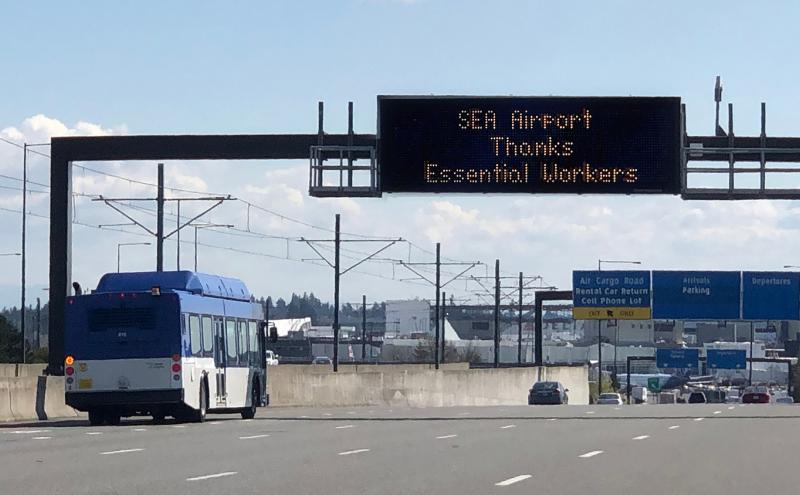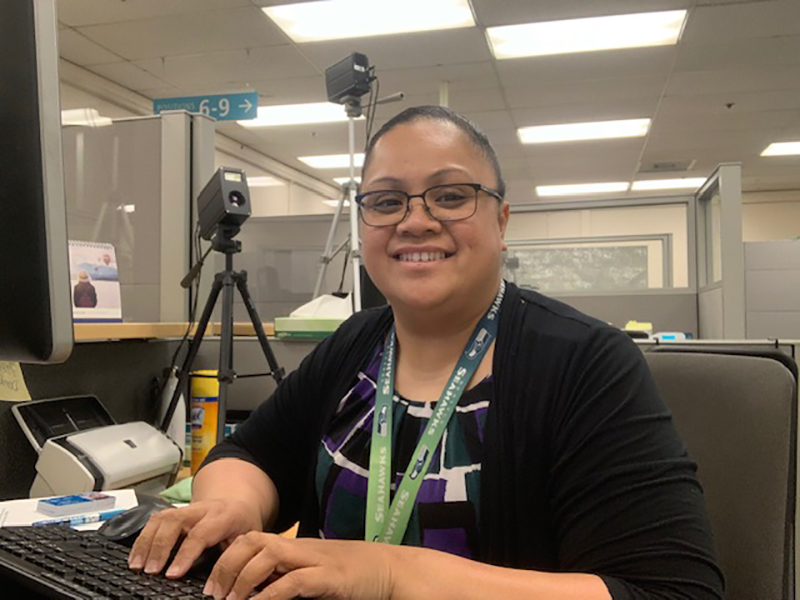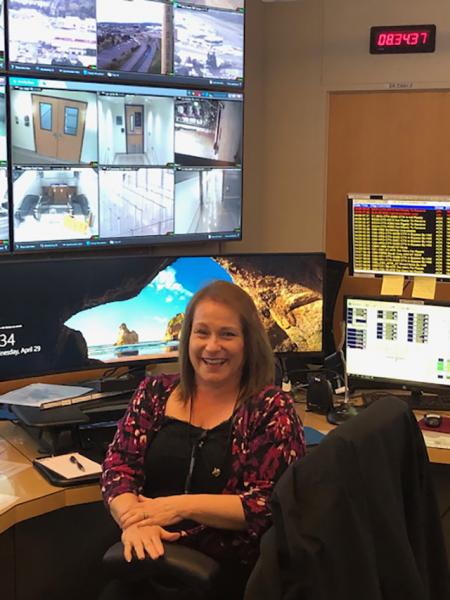
This is the first of our Frontline Fridays series featuring Port employees whose hard work and dedication keeps our facilities running safely during challenging times.
Today we check in with three employees who are working tirelessly to keep SEA Airport safe for passengers and employees, efficient in moving people to and from their destinations, and open for essential operations like transporting goods and supplies in and out of the region.
Phaedra Fatuesi, Credential Center Supervisor, Seattle-Tacoma International Airport (SEA)

1. Tell us about your job responsibilities on a typical day?
I supervise the Credential Center at Seattle-Tacoma International Airport (SEA), that issues security badges for access to employees and contractors to the restricted areas at the airport.
2. How has your work been affected by COVID-19?
We have been operating with limited staff because so many people qualify for (Public Health Emergency) Leave. We’re down to about half of our regular staff and have reduced the operating hours for the Credential Center from 8 a.m. to 2 p.m. For now we only accepting walk-in appointments because we don’t know what our staffing levels will be for a particular day. Many companies are still hiring contractors and the line outside our office is constant — it’s busier than the Transportation Security Administration (TSA) and Ticket Counter lines combined right now.
3. What extra precautions or protocols make you feel safe right now?
We had plexiglass installed at all positions where we interact with people coming into the center. We also rearranged our line outside to ensure that everyone is staying six feet apart to observe social distancing guidelines. We have provided wipes at our training center and our office is cleaned twice a day. We’ve been coordinating with Port Health and Safety and Emergency Preparedness departments to make sure we have enough Lysol wipes, hand sanitizers, and disinfectant sprays.
4. How is your job essential to keeping airport operations going?
We issue security badges that give people access to their jobs inside the restricted area of the airport. Right now, it’s typically only taking a day or two for background checks to clear and contractors can get in here easily and get processed, so we can keep the airport running.
5. What keeps you motivated while working during this challenging time?
The Credential Center specialists coming in here with a smile, ready to get the day started keep me going. When I need something they are always here and there is a lot of open communication in our office. Also just getting out of the house can be nice — a lot of people have cabin fever right now. We want to help people and get them processed and ready to go. So many people are thanking us for being here.
Steve Downey, Security Access Controller, Seattle-Tacoma International Airport (SEA)
1. Tell us about your job responsibilities on a typical day?
On a daily basis we control access at vehicle gates on the perimeter of the airfield and inspect the fence line around the airfield. We also staff the satellite train exits and walk through construction sites and the cargo building to make sure we comply with TSA regulations. Inside the terminals we respond to alarms, assist customers, and help airlines open secure doors. Right now I’m a shift lead, so I do a little bit of everything.
2. How have your role and responsibilities changed since COVID-19?
Our department has been hit with a lot of people being out on leave, so we have adjusted working hours and are all taking on many different job responsibilities. With fewer people, our team is doing a good job coming together as a team and we’re staying compliant. In the past, employees would focus on one task like a inspecting a fence then inspecting cargo inspection, and monitoring terminals; now we are all taking on multiple tasks which gives us more variety. We’re trying to adapt every day — there’s always something different happening depending on staffing levels.
3. How is your job essential to keeping airport operations going?
We need to be onsite so airlines can maintain operations, keep perimeter vehicle gates open, and move cargo. Although passenger volumes are down, airlines and cargo operations are still running.
4. What is keeping you motivated during this challenging time?
My employees are great people and we don’t want to let anybody down and want to get the day’s mission done. We all want to be a good team player and coworker and lift each other up and help each other out. Comradery is a big aspect — when people have a good attitude, it helps a lot. We’ve received support from different departments. Everyone is in same situation so we’re putting in a little extra to help where needed.
5. What has been most challenging about this experience?
It’s been challenging to see how empty the airport is. I know there’s got to be a light at the end of tunnel but it’s going to be a longer process and it won’t be the same overnight. So many people have been affected by this. I’m looking forward to the hustle and bustle of the airport again, when businesses come back, and having interactions with passengers.
Susan Lee, Airport Communications Center (ACC), Senior Operations Controller

1. Tell us about your job responsibilities on a typical day?
I’ve worked in the Communications Center for 28 years. We have a staff of close to 20 and on a typical day, we have four people working day shift, four people working swing shift, and four people working nights. Right now we are working with two people on each shift. There are four different primary functions in the ACC:
- Resource management, where we plot and plan gate/resource parking for aircraft
- Satellite Train Service operation, to keep trains running and advise of any malfunctions
- Security Monitor Access Control System, to coordinate with security on breaches and security door issues
- Baggage maintenance, to monitor and call out alarms for the miles and miles of baggage conveyors and respond to maintenance calls
2. What do you like about your job?
I like pretty much everything about my job. It’s fast-paced and things change constantly, like policies and procedures and technology. The mapping of gates is like Tetris. You have to get airplanes to fit at the gates, and it can be pretty involved and time consuming.
3. What has changed about your job in light of COVID-19?
Our responsibilities have remained the same, but the volume has decreased quite a bit. There aren’t as many travelers or bags coming through, but we still get general maintenance calls, or a call out for a jam in the baggage system. We also still need to accommodate the airlines and find open gates for aircraft.
4. How is your job essential to keeping airport operations going?
The ACC is often referred to as the heartbeat of the airport. A lot of information travels through here and we are the primary notification system, sending out pages and alerts to the airport team. If we weren’t here, there would be a significant impact, if not stoppage of, critical airport functions. We definitely need to be here.
5. What precautions are you taking that are making you feel safe right now?
Our group is fairly small and because the ACC is staffed 24/7, we are rotating in and out constantly. We all take safety very seriously. We have hand sanitizer for wiping down individual spaces and we are good at keeping our space clean. We have reduced our staffing to the bare minimum to allow those at high risk or with children to remain safely at home. We have also made it clear if you don’t need to be in here, you don’t enter. Management has allowed us to enter the building via the tunnel, so we aren’t exposed to the general public. We’re lucky that management has provided us with all the things we need to work safely even when it is in short supply.
6. What keeps you motivated right now?
Knowing that my job is important is very motivating. What we do in the ACC is important. As long as we all feel safe, we will be here to keep the airport running … because it has to. The majority of people who work in the ACC have worked together for many years and we know we’re essential to keep this place going. If we walk away, that’s not going to happen. We trust each other and that we’re doing the right thing.
- Watch a video of frontline workers at the Port








